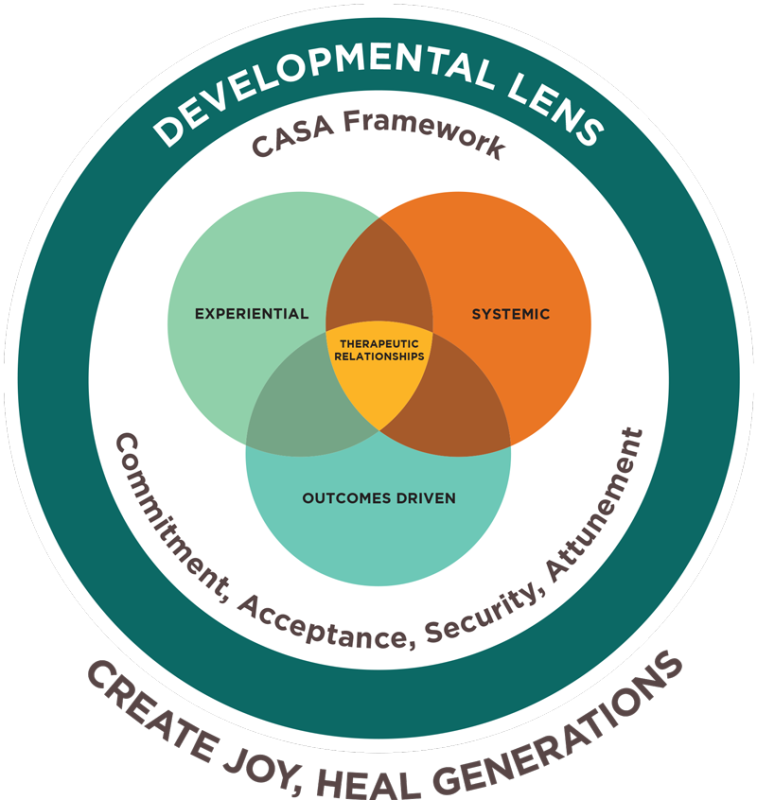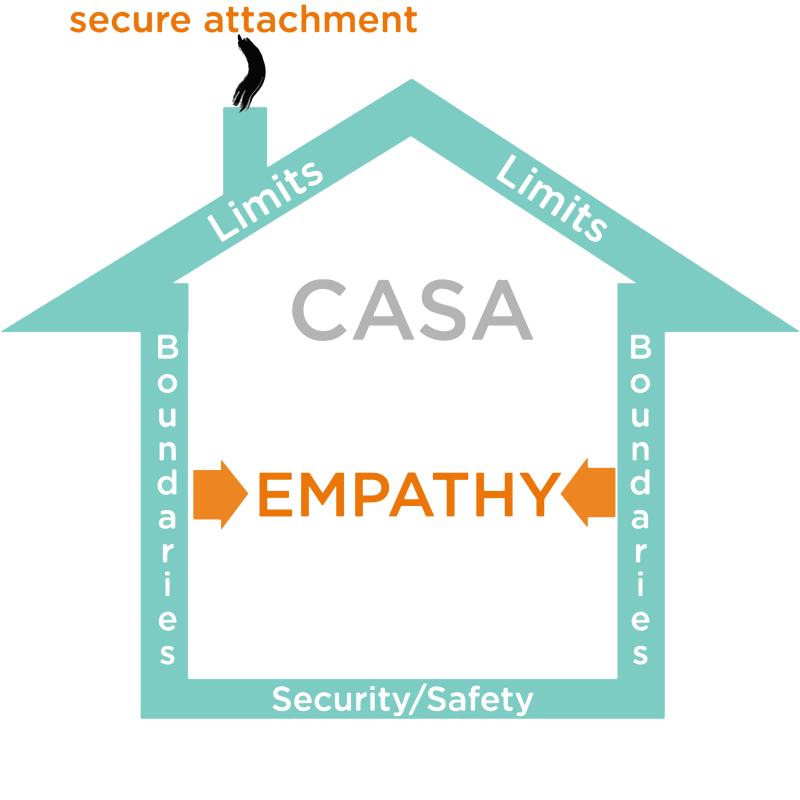Our Therapeutic Approach
The Embark Behavioral Health treatment approach provides an evidenced-based therapeutic structure to create effective growth, learning and healing. It guides, informs, and provides quality control for the implementation of best practices within all Embark programs.
The core principle of our approach is to engage in therapeutic relationships that create emotional, behavioral, physiological, and relational healing. This approach is not limited to interactions between clients and therapists but also between the young people we serve, and their families.

Our approach focuses on six key concepts:
The Developmental Lens
The developmental lens is the foundation of the Embark therapeutic approach. Understanding and being aware of where a person and their family are developmentally is the key to grasping how growth throughout the lifespan relies on interpersonal relationships, which are essential for healthy physical, emotional, and relational development. The developmental lens needs an understanding of science- and research-based information about physiological, neurological, and psychological factors, which significantly influence healthy development and heal generations.
The CASA Developmental Framework
When explaining what Embark does clinically, we start with the CASA Developmental Framework, which emphasizes the importance of experiencing secure attachment between clients and caregivers throughout development. CASA is an acronym for commitment, acceptance, security, and attunement.
The CASA Framework’s purpose is to developmentally heal and strengthen the functional, mental and physical health of teenagers, young adults, and their families, by creating joy that is experienced through warm and responsive interactions.
Each part of the framework is critical to treatment.
Commitment
Commitment is defined as unwavering dedication and accurately reflects what a child requires from their caregiver for healthy development. The child needs the caregiver to be committed to supporting their physical and emotional needs while still being sincere and dedicated that caring for another is intrinsically valuable and a source of joy.
Acceptance
Acceptance is a profound experience of inherent worth of another. The caregiver believes the child has intrinsic worth, which makes it less likely that they'll feel resentful if this young person doesn't meet their expectations.
Security
Security is the sole responsibility of the caregiver and is not contingent on the child emotional or behavioral responses. Individuals experience profound safety –and a sense of worth-- when caregivers establish security and know that they are worth having structure in place to nurture them. Once security is proven, the caregiver can provide attunement.
Attunement
Attunement is established when the caregiver can put empathy into action and view the child’s behavior as a reflection of their current emotional state. By providing attunement, and staying consistent and empathetic, they can help their child regulate their emotions and physical state, also known as co-regulation. Attunement requires the caregiver to consistently demonstrate commitment, acceptance, and security.

Systemic Approach
Humans are social creatures, hard wired for connection. Taking a systemic approach means we honor everyone’s experiences and patterns of function, which significantly impacts our development, emotions, behaviors, relationships, and functioning. Using systemic approaches in therapy, academics, and management is essential to providing the best treatment.
We believe healing is a joint process that the entire family takes part in. A systemic approach provides the most sophisticated tools for whole-family healing, because it changes the experience and environment that the negative behaviors and emotions needed in order to existed. This approach will replace current family interactions and communication with healthier ones, that foster connection and healing.
Experiential
Development requires actual life and relational experience. To develop emotionally, psychologically, and even physically, we need reliable and repeated experiences of safety and security from caregivers. Creating an experience of safety and acceptance is necessary in healthy growth. Just telling someone they’re safe and accepted is ineffective. Experiential approaches create engagement using the whole person and all their senses and their environment. This creates powerful neurobiological changes. We use therapeutic experiential methods to optimize emotional, physical, and relational development as informed by the CASA Framework.
Healing comes from therapeutic experiential activities, an experience-based, hands-on approach to treatment which often takes place outside an office. Our therapists use creativity in our treatment like going to a park or interacting with animals, allowing them to provide treatment in a more relaxed environment.



Outcomes–Driven Treatment
All Embark programs measure client outcomes using internationally and empirically validated instruments [surveys and questionnaires]. Outcomes are a tool that helps us live congruently to our values and best attune to where each client and family is on their therapeutic journey, so clients get a customized experience. This ensures a strong therapeutic relationship between our providers and those they serve.
At Embark, we lead the mental care industry the way in providing data-informed, outcomes-driven treatment because we’ve invested the time and money needed to collect data across more than 13 areas of client and family health for up to two years post-treatment. We use client data diagnostics in real time with data-driven benchmarking and best practices.
Therapeutic Relationships
People heal in the context of relationships because the relationship itself provides the opportunity to experience acceptance, challenge, and — ultimately — the integration of parts of oneself. With that in mind, we recognize how important it is for clients to have a therapeutic relationship with their provider and to have meaningful therapeutic relationships in their lives. So, our approach is structured so that every aspect of treatment sequentially builds toward therapeutic development and healing.
It’s important to note that the therapist is not the only person involved in achieving the desired outcomes. Healthy relationships with parents and other key people in their lives are critical to healing for adolescents, teens, and young adults.



The Result: Create Joy, Heal Generations
Thanks to the Embark treatment approach, we create joy and heal generations. But what, exactly, is joy? It's much more than happiness. We experience joy when we find meaning in suffering and delight in happiness because of the neurobiological experience of having worth within safe and healthy relationships. We're honored to make this possible for families across the United States.

Standards of Treatment
Embark has high standards of treatment at all programs and levels of care. Inherent in the standards is the belief that young people thrive when they’re met with compassion and understanding and given tools to navigate their struggles on their path to healing.



